Litigation Attorney Resume Examples

Jul 18, 2024
|
12 min read
Craft your litigation attorney resume: evidence-based tips to make your skills stand out and win your next case.
Rated by 348 people
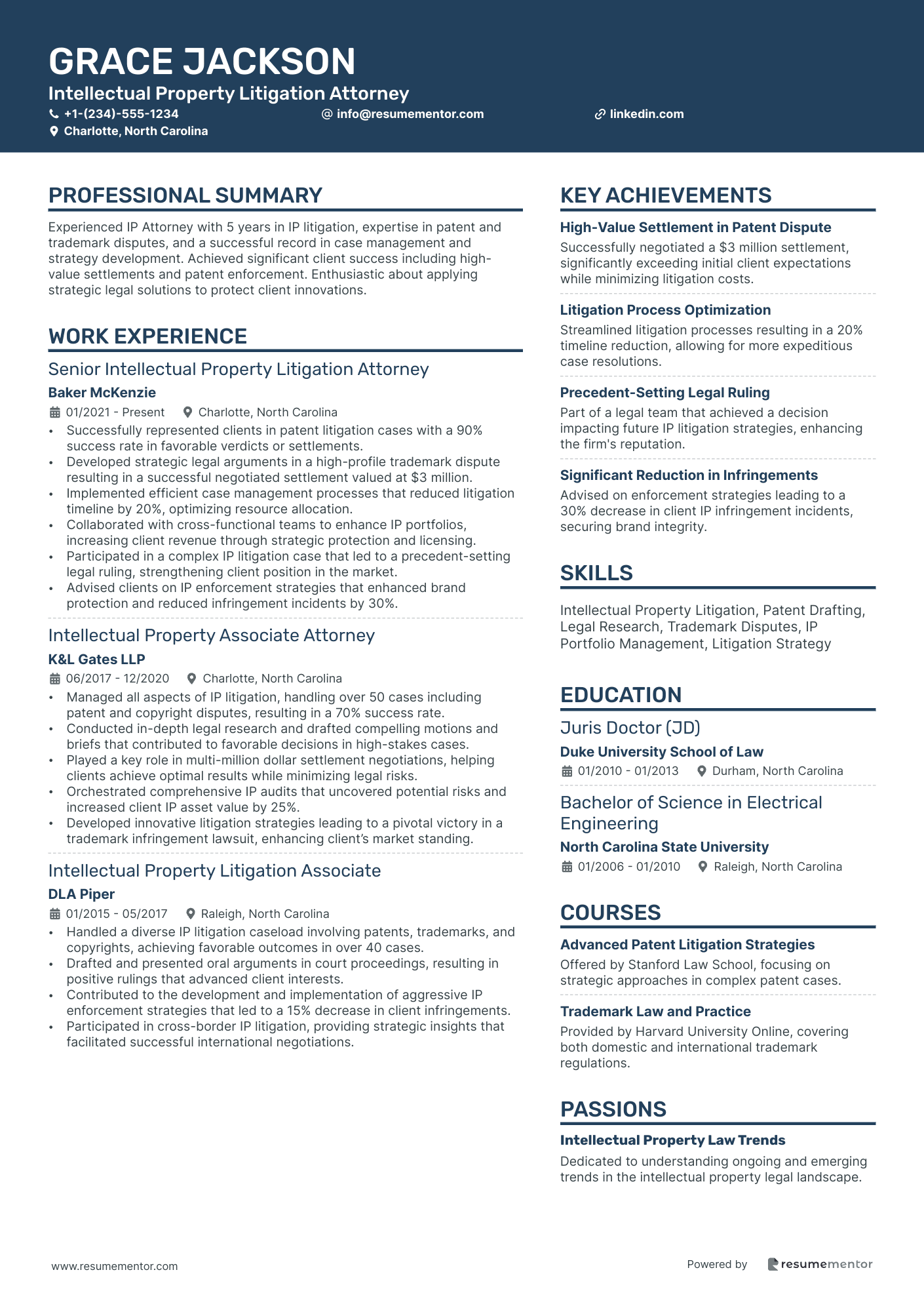
Intellectual Property Litigation Attorney
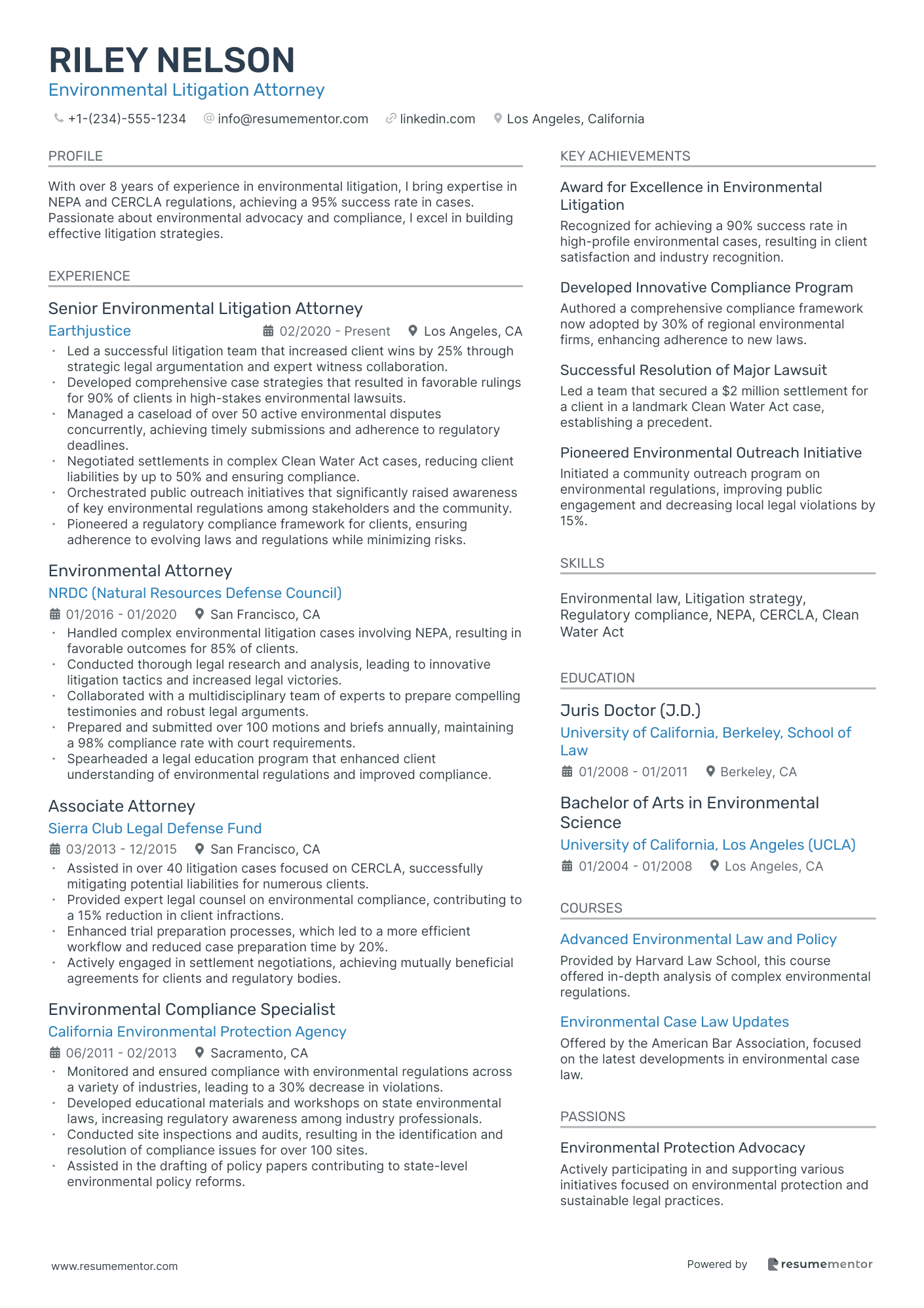
Environmental Litigation Attorney
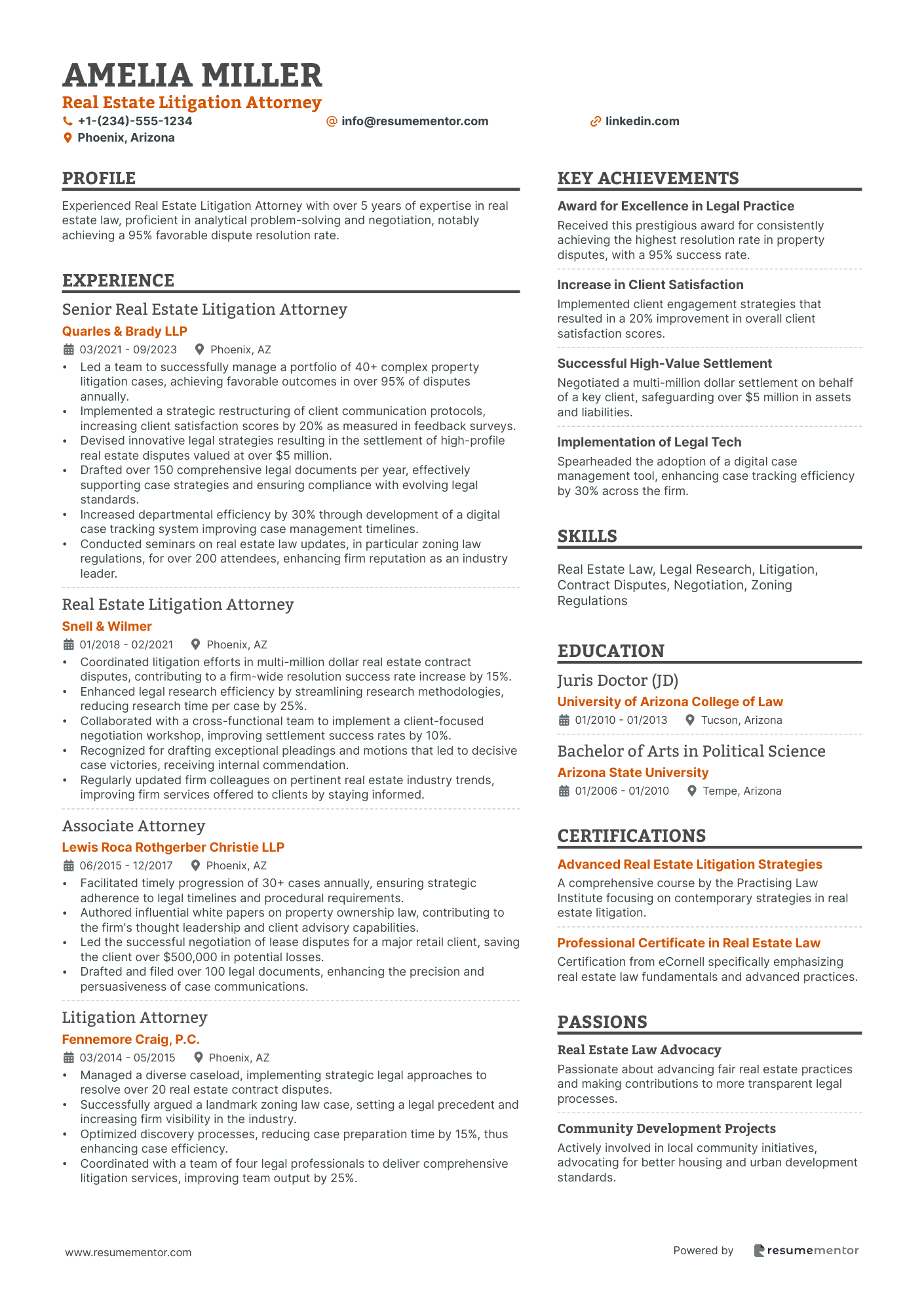
Real Estate Litigation Attorney
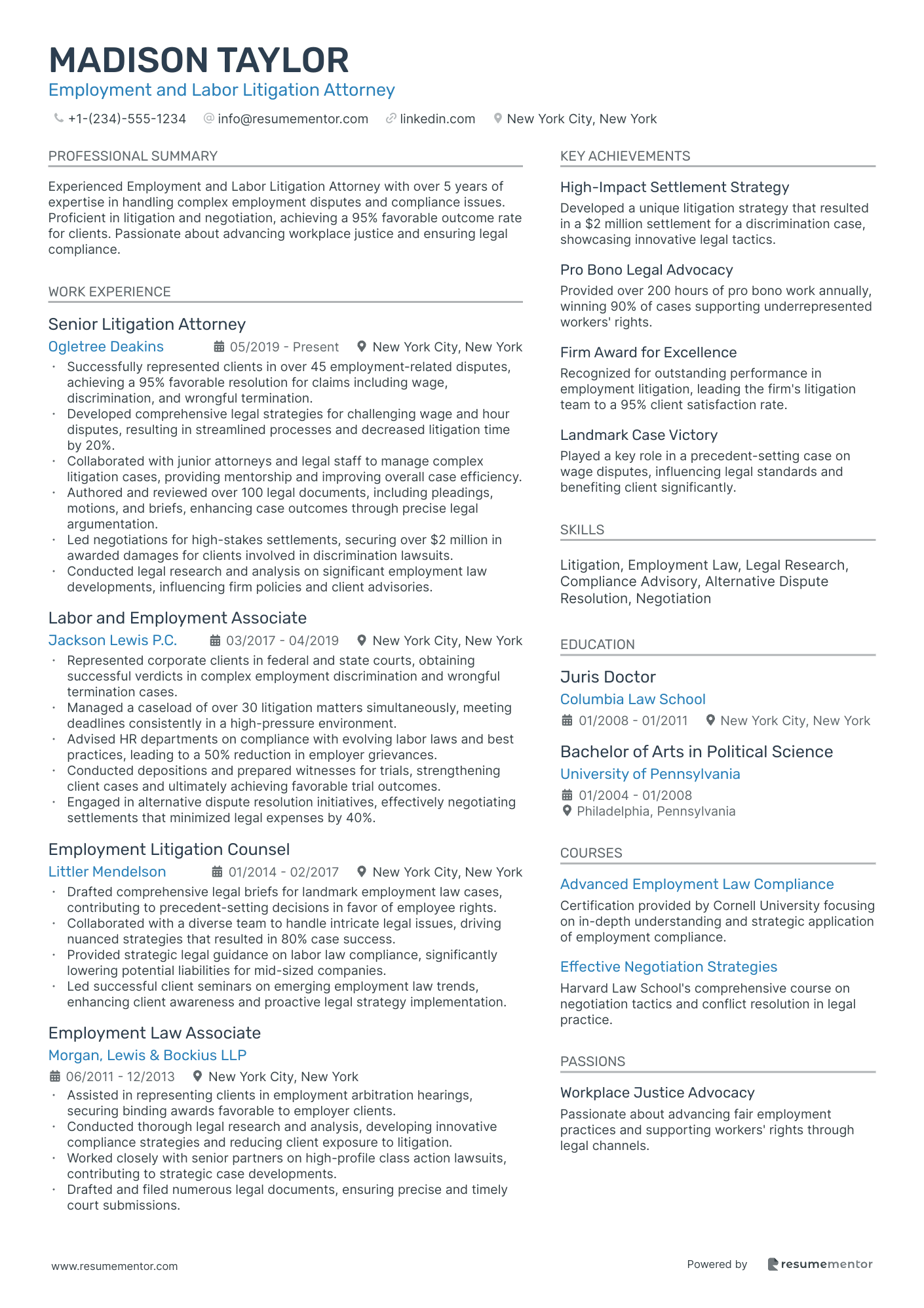
Employment and Labor Litigation Attorney
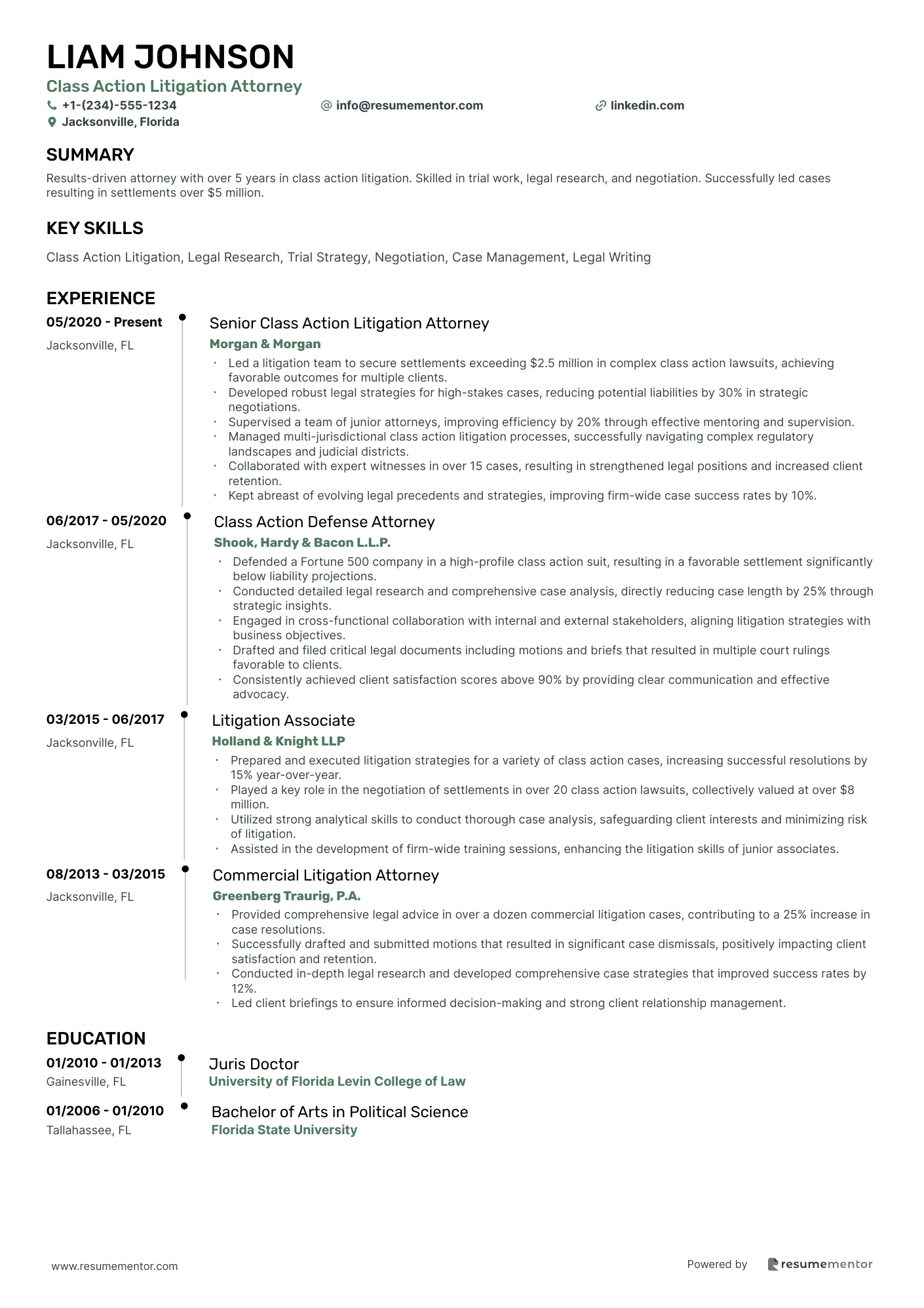
Class Action Litigation Attorney
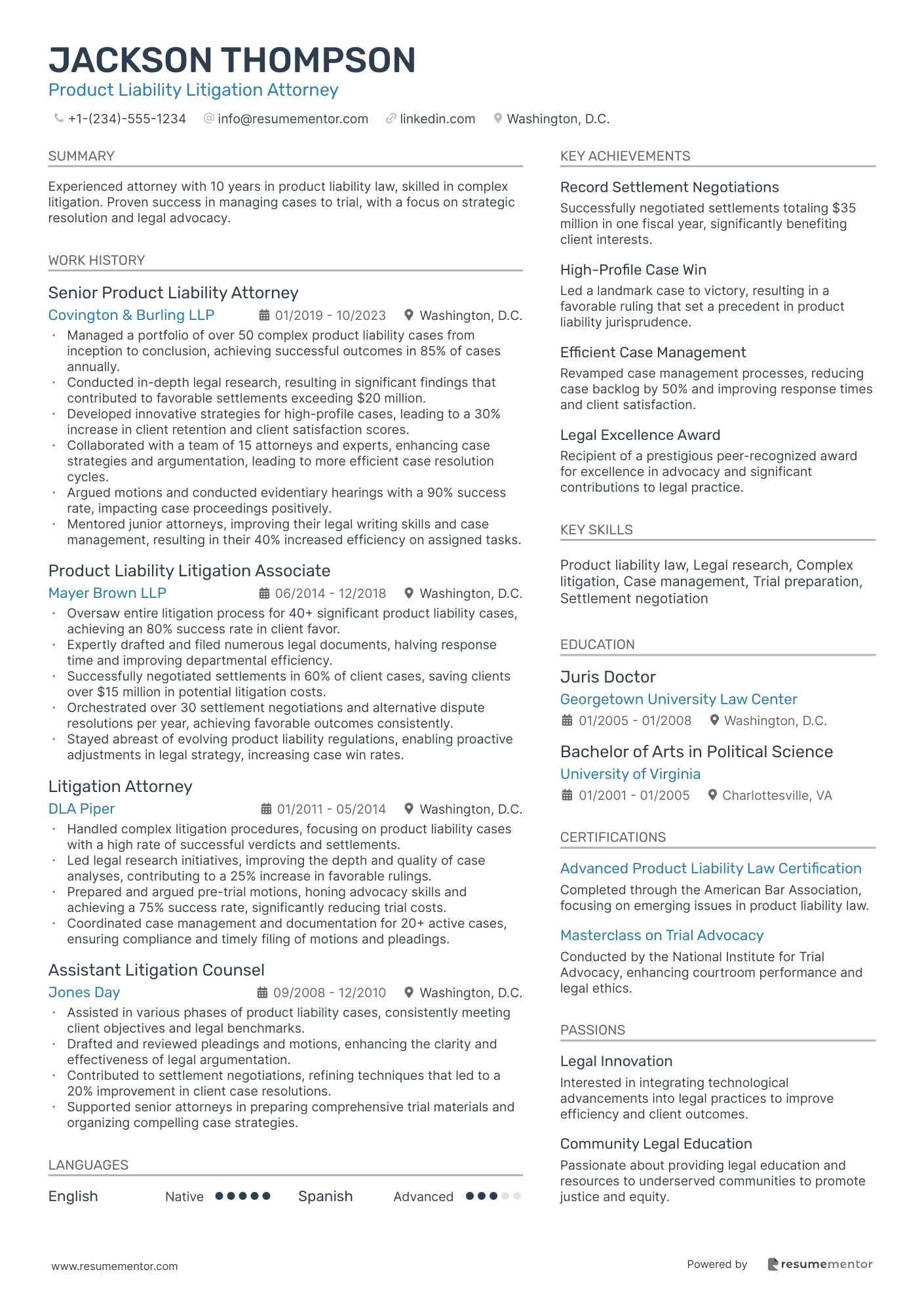
Product Liability Litigation Attorney
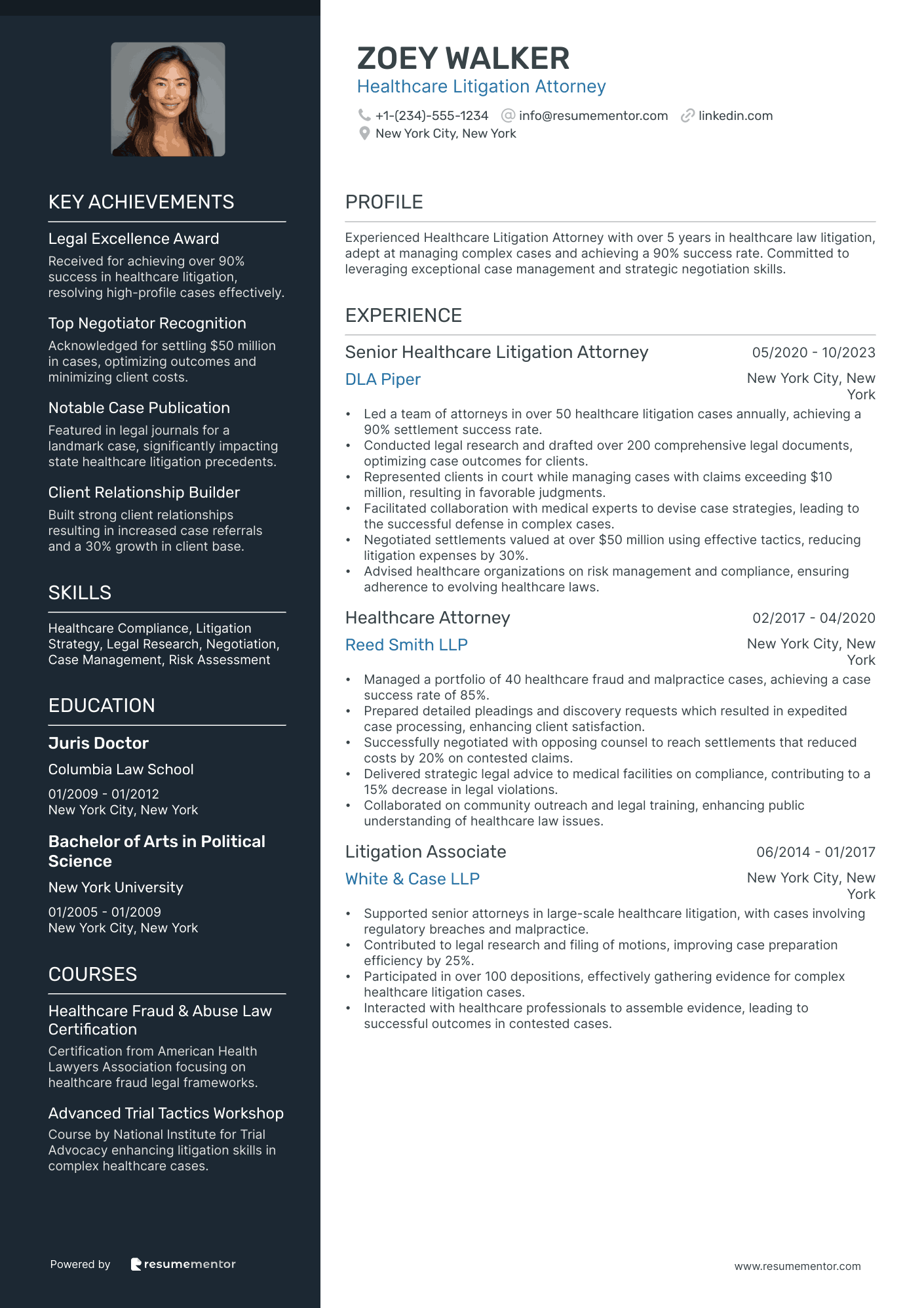
Healthcare Litigation Attorney
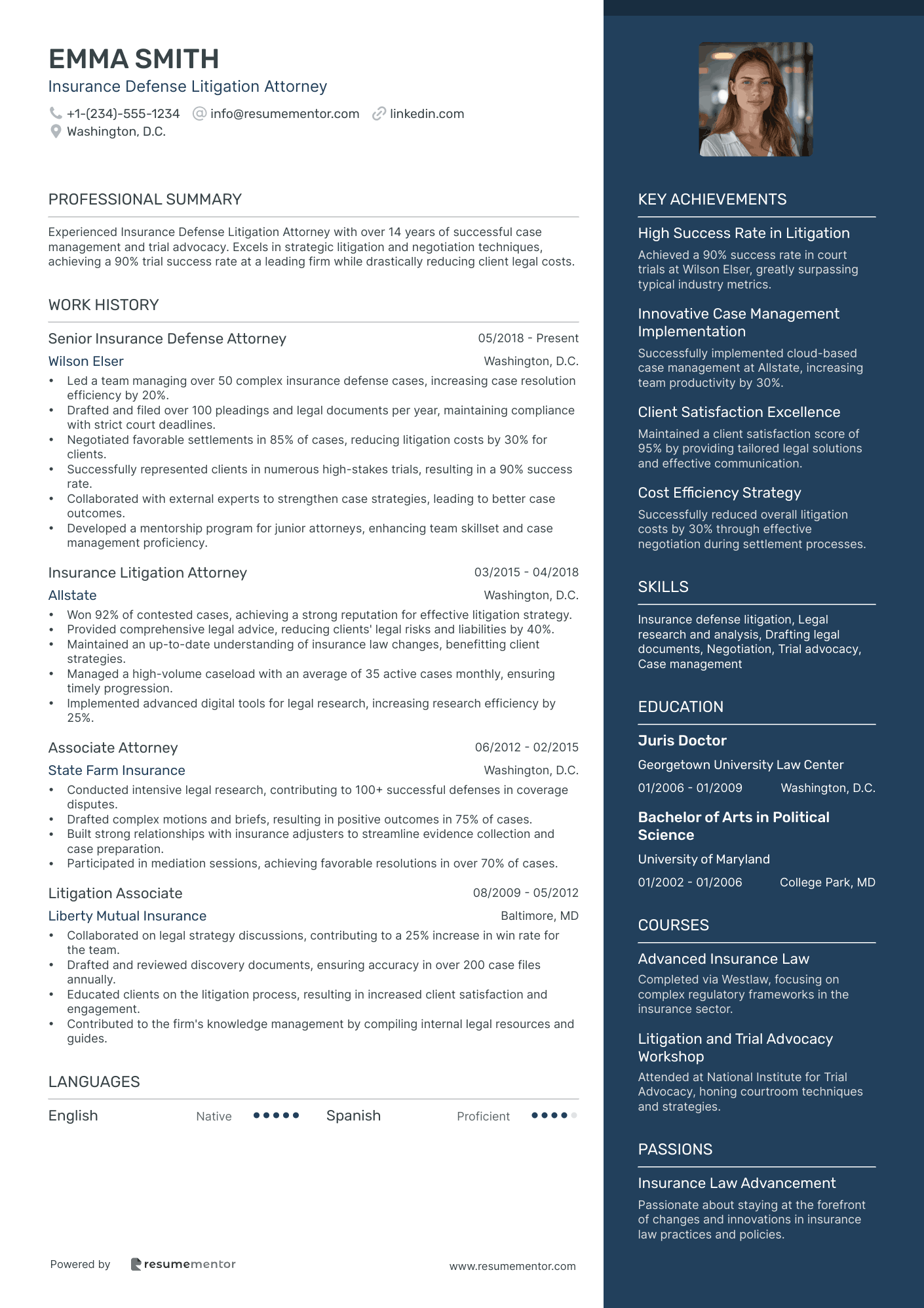
Insurance Defense Litigation Attorney

Intellectual Property Litigation Attorney resume sample
- •Successfully represented clients in patent litigation cases with a 90% success rate in favorable verdicts or settlements.
- •Developed strategic legal arguments in a high-profile trademark dispute resulting in a successful negotiated settlement valued at $3 million.
- •Implemented efficient case management processes that reduced litigation timeline by 20%, optimizing resource allocation.
- •Collaborated with cross-functional teams to enhance IP portfolios, increasing client revenue through strategic protection and licensing.
- •Participated in a complex IP litigation case that led to a precedent-setting legal ruling, strengthening client position in the market.
- •Advised clients on IP enforcement strategies that enhanced brand protection and reduced infringement incidents by 30%.
- •Managed all aspects of IP litigation, handling over 50 cases including patent and copyright disputes, resulting in a 70% success rate.
- •Conducted in-depth legal research and drafted compelling motions and briefs that contributed to favorable decisions in high-stakes cases.
- •Played a key role in multi-million dollar settlement negotiations, helping clients achieve optimal results while minimizing legal risks.
- •Orchestrated comprehensive IP audits that uncovered potential risks and increased client IP asset value by 25%.
- •Developed innovative litigation strategies leading to a pivotal victory in a trademark infringement lawsuit, enhancing client’s market standing.
- •Handled a diverse IP litigation caseload involving patents, trademarks, and copyrights, achieving favorable outcomes in over 40 cases.
- •Drafted and presented oral arguments in court proceedings, resulting in positive rulings that advanced client interests.
- •Contributed to the development and implementation of aggressive IP enforcement strategies that led to a 15% decrease in client infringements.
- •Participated in cross-border IP litigation, providing strategic insights that facilitated successful international negotiations.
- •Assisted in preparing patent applications and supported litigation efforts to strengthen client IP portfolios effectively.
- •Conducted competitive analyses of IP landscapes leading to actionable insights that informed client licensing strategies.
- •Facilitated workshops with clients to educate them on IP protection measures, increasing awareness and proactive engagement.
- •Developed IP enforcement policies that were implemented across multiple client organizations, resulting in enhanced legal compliance.
Environmental Litigation Attorney resume sample
- •Led a successful litigation team that increased client wins by 25% through strategic legal argumentation and expert witness collaboration.
- •Developed comprehensive case strategies that resulted in favorable rulings for 90% of clients in high-stakes environmental lawsuits.
- •Managed a caseload of over 50 active environmental disputes concurrently, achieving timely submissions and adherence to regulatory deadlines.
- •Negotiated settlements in complex Clean Water Act cases, reducing client liabilities by up to 50% and ensuring compliance.
- •Orchestrated public outreach initiatives that significantly raised awareness of key environmental regulations among stakeholders and the community.
- •Pioneered a regulatory compliance framework for clients, ensuring adherence to evolving laws and regulations while minimizing risks.
- •Handled complex environmental litigation cases involving NEPA, resulting in favorable outcomes for 85% of clients.
- •Conducted thorough legal research and analysis, leading to innovative litigation tactics and increased legal victories.
- •Collaborated with a multidisciplinary team of experts to prepare compelling testimonies and robust legal arguments.
- •Prepared and submitted over 100 motions and briefs annually, maintaining a 98% compliance rate with court requirements.
- •Spearheaded a legal education program that enhanced client understanding of environmental regulations and improved compliance.
- •Assisted in over 40 litigation cases focused on CERCLA, successfully mitigating potential liabilities for numerous clients.
- •Provided expert legal counsel on environmental compliance, contributing to a 15% reduction in client infractions.
- •Enhanced trial preparation processes, which led to a more efficient workflow and reduced case preparation time by 20%.
- •Actively engaged in settlement negotiations, achieving mutually beneficial agreements for clients and regulatory bodies.
- •Monitored and ensured compliance with environmental regulations across a variety of industries, leading to a 30% decrease in violations.
- •Developed educational materials and workshops on state environmental laws, increasing regulatory awareness among industry professionals.
- •Conducted site inspections and audits, resulting in the identification and resolution of compliance issues for over 100 sites.
- •Assisted in the drafting of policy papers contributing to state-level environmental policy reforms.
Real Estate Litigation Attorney resume sample
- •Led a team to successfully manage a portfolio of 40+ complex property litigation cases, achieving favorable outcomes in over 95% of disputes annually.
- •Implemented a strategic restructuring of client communication protocols, increasing client satisfaction scores by 20% as measured in feedback surveys.
- •Devised innovative legal strategies resulting in the settlement of high-profile real estate disputes valued at over $5 million.
- •Drafted over 150 comprehensive legal documents per year, effectively supporting case strategies and ensuring compliance with evolving legal standards.
- •Increased departmental efficiency by 30% through development of a digital case tracking system improving case management timelines.
- •Conducted seminars on real estate law updates, in particular zoning law regulations, for over 200 attendees, enhancing firm reputation as an industry leader.
- •Coordinated litigation efforts in multi-million dollar real estate contract disputes, contributing to a firm-wide resolution success rate increase by 15%.
- •Enhanced legal research efficiency by streamlining research methodologies, reducing research time per case by 25%.
- •Collaborated with a cross-functional team to implement a client-focused negotiation workshop, improving settlement success rates by 10%.
- •Recognized for drafting exceptional pleadings and motions that led to decisive case victories, receiving internal commendation.
- •Regularly updated firm colleagues on pertinent real estate industry trends, improving firm services offered to clients by staying informed.
- •Facilitated timely progression of 30+ cases annually, ensuring strategic adherence to legal timelines and procedural requirements.
- •Authored influential white papers on property ownership law, contributing to the firm's thought leadership and client advisory capabilities.
- •Led the successful negotiation of lease disputes for a major retail client, saving the client over $500,000 in potential losses.
- •Drafted and filed over 100 legal documents, enhancing the precision and persuasiveness of case communications.
- •Managed a diverse caseload, implementing strategic legal approaches to resolve over 20 real estate contract disputes.
- •Successfully argued a landmark zoning law case, setting a legal precedent and increasing firm visibility in the industry.
- •Optimized discovery processes, reducing case preparation time by 15%, thus enhancing case efficiency.
- •Coordinated with a team of four legal professionals to deliver comprehensive litigation services, improving team output by 25%.
Employment and Labor Litigation Attorney resume sample
- •Successfully represented clients in over 45 employment-related disputes, achieving a 95% favorable resolution for claims including wage, discrimination, and wrongful termination.
- •Developed comprehensive legal strategies for challenging wage and hour disputes, resulting in streamlined processes and decreased litigation time by 20%.
- •Collaborated with junior attorneys and legal staff to manage complex litigation cases, providing mentorship and improving overall case efficiency.
- •Authored and reviewed over 100 legal documents, including pleadings, motions, and briefs, enhancing case outcomes through precise legal argumentation.
- •Led negotiations for high-stakes settlements, securing over $2 million in awarded damages for clients involved in discrimination lawsuits.
- •Conducted legal research and analysis on significant employment law developments, influencing firm policies and client advisories.
- •Represented corporate clients in federal and state courts, obtaining successful verdicts in complex employment discrimination and wrongful termination cases.
- •Managed a caseload of over 30 litigation matters simultaneously, meeting deadlines consistently in a high-pressure environment.
- •Advised HR departments on compliance with evolving labor laws and best practices, leading to a 50% reduction in employer grievances.
- •Conducted depositions and prepared witnesses for trials, strengthening client cases and ultimately achieving favorable trial outcomes.
- •Engaged in alternative dispute resolution initiatives, effectively negotiating settlements that minimized legal expenses by 40%.
- •Drafted comprehensive legal briefs for landmark employment law cases, contributing to precedent-setting decisions in favor of employee rights.
- •Collaborated with a diverse team to handle intricate legal issues, driving nuanced strategies that resulted in 80% case success.
- •Provided strategic legal guidance on labor law compliance, significantly lowering potential liabilities for mid-sized companies.
- •Led successful client seminars on emerging employment law trends, enhancing client awareness and proactive legal strategy implementation.
- •Assisted in representing clients in employment arbitration hearings, securing binding awards favorable to employer clients.
- •Conducted thorough legal research and analysis, developing innovative compliance strategies and reducing client exposure to litigation.
- •Worked closely with senior partners on high-profile class action lawsuits, contributing to strategic case developments.
- •Drafted and filed numerous legal documents, ensuring precise and timely court submissions.
Class Action Litigation Attorney resume sample
- •Led a litigation team to secure settlements exceeding $2.5 million in complex class action lawsuits, achieving favorable outcomes for multiple clients.
- •Developed robust legal strategies for high-stakes cases, reducing potential liabilities by 30% in strategic negotiations.
- •Supervised a team of junior attorneys, improving efficiency by 20% through effective mentoring and supervision.
- •Managed multi-jurisdictional class action litigation processes, successfully navigating complex regulatory landscapes and judicial districts.
- •Collaborated with expert witnesses in over 15 cases, resulting in strengthened legal positions and increased client retention.
- •Kept abreast of evolving legal precedents and strategies, improving firm-wide case success rates by 10%.
- •Defended a Fortune 500 company in a high-profile class action suit, resulting in a favorable settlement significantly below liability projections.
- •Conducted detailed legal research and comprehensive case analysis, directly reducing case length by 25% through strategic insights.
- •Engaged in cross-functional collaboration with internal and external stakeholders, aligning litigation strategies with business objectives.
- •Drafted and filed critical legal documents including motions and briefs that resulted in multiple court rulings favorable to clients.
- •Consistently achieved client satisfaction scores above 90% by providing clear communication and effective advocacy.
- •Prepared and executed litigation strategies for a variety of class action cases, increasing successful resolutions by 15% year-over-year.
- •Played a key role in the negotiation of settlements in over 20 class action lawsuits, collectively valued at over $8 million.
- •Utilized strong analytical skills to conduct thorough case analysis, safeguarding client interests and minimizing risk of litigation.
- •Assisted in the development of firm-wide training sessions, enhancing the litigation skills of junior associates.
- •Provided comprehensive legal advice in over a dozen commercial litigation cases, contributing to a 25% increase in case resolutions.
- •Successfully drafted and submitted motions that resulted in significant case dismissals, positively impacting client satisfaction and retention.
- •Conducted in-depth legal research and developed comprehensive case strategies that improved success rates by 12%.
- •Led client briefings to ensure informed decision-making and strong client relationship management.
Product Liability Litigation Attorney resume sample
- •Managed a portfolio of over 50 complex product liability cases from inception to conclusion, achieving successful outcomes in 85% of cases annually.
- •Conducted in-depth legal research, resulting in significant findings that contributed to favorable settlements exceeding $20 million.
- •Developed innovative strategies for high-profile cases, leading to a 30% increase in client retention and client satisfaction scores.
- •Collaborated with a team of 15 attorneys and experts, enhancing case strategies and argumentation, leading to more efficient case resolution cycles.
- •Argued motions and conducted evidentiary hearings with a 90% success rate, impacting case proceedings positively.
- •Mentored junior attorneys, improving their legal writing skills and case management, resulting in their 40% increased efficiency on assigned tasks.
- •Oversaw entire litigation process for 40+ significant product liability cases, achieving an 80% success rate in client favor.
- •Expertly drafted and filed numerous legal documents, halving response time and improving departmental efficiency.
- •Successfully negotiated settlements in 60% of client cases, saving clients over $15 million in potential litigation costs.
- •Orchestrated over 30 settlement negotiations and alternative dispute resolutions per year, achieving favorable outcomes consistently.
- •Stayed abreast of evolving product liability regulations, enabling proactive adjustments in legal strategy, increasing case win rates.
- •Handled complex litigation procedures, focusing on product liability cases with a high rate of successful verdicts and settlements.
- •Led legal research initiatives, improving the depth and quality of case analyses, contributing to a 25% increase in favorable rulings.
- •Prepared and argued pre-trial motions, honing advocacy skills and achieving a 75% success rate, significantly reducing trial costs.
- •Coordinated case management and documentation for 20+ active cases, ensuring compliance and timely filing of motions and pleadings.
- •Assisted in various phases of product liability cases, consistently meeting client objectives and legal benchmarks.
- •Drafted and reviewed pleadings and motions, enhancing the clarity and effectiveness of legal argumentation.
- •Contributed to settlement negotiations, refining techniques that led to a 20% improvement in client case resolutions.
- •Supported senior attorneys in preparing comprehensive trial materials and organizing compelling case strategies.
Healthcare Litigation Attorney resume sample
- •Led a team of attorneys in over 50 healthcare litigation cases annually, achieving a 90% settlement success rate.
- •Conducted legal research and drafted over 200 comprehensive legal documents, optimizing case outcomes for clients.
- •Represented clients in court while managing cases with claims exceeding $10 million, resulting in favorable judgments.
- •Facilitated collaboration with medical experts to devise case strategies, leading to the successful defense in complex cases.
- •Negotiated settlements valued at over $50 million using effective tactics, reducing litigation expenses by 30%.
- •Advised healthcare organizations on risk management and compliance, ensuring adherence to evolving healthcare laws.
- •Managed a portfolio of 40 healthcare fraud and malpractice cases, achieving a case success rate of 85%.
- •Prepared detailed pleadings and discovery requests which resulted in expedited case processing, enhancing client satisfaction.
- •Successfully negotiated with opposing counsel to reach settlements that reduced costs by 20% on contested claims.
- •Delivered strategic legal advice to medical facilities on compliance, contributing to a 15% decrease in legal violations.
- •Collaborated on community outreach and legal training, enhancing public understanding of healthcare law issues.
- •Supported senior attorneys in large-scale healthcare litigation, with cases involving regulatory breaches and malpractice.
- •Contributed to legal research and filing of motions, improving case preparation efficiency by 25%.
- •Participated in over 100 depositions, effectively gathering evidence for complex healthcare litigation cases.
- •Interacted with healthcare professionals to assemble evidence, leading to successful outcomes in contested cases.
- •Assisted in drafting legal documents for healthcare litigation cases, contributing to a 20% reduction in preparation times.
- •Conducted preliminary research on healthcare statutes, enriching the team's strategic approach to case analysis.
- •Coordinated with clients to ensure timely submission of necessary documentation, improving case management efficiency.
- •Supported litigation team during court hearings and depositions, facilitating seamless operational workflow.
Insurance Defense Litigation Attorney resume sample
- •Led a team managing over 50 complex insurance defense cases, increasing case resolution efficiency by 20%.
- •Drafted and filed over 100 pleadings and legal documents per year, maintaining compliance with strict court deadlines.
- •Negotiated favorable settlements in 85% of cases, reducing litigation costs by 30% for clients.
- •Successfully represented clients in numerous high-stakes trials, resulting in a 90% success rate.
- •Collaborated with external experts to strengthen case strategies, leading to better case outcomes.
- •Developed a mentorship program for junior attorneys, enhancing team skillset and case management proficiency.
- •Won 92% of contested cases, achieving a strong reputation for effective litigation strategy.
- •Provided comprehensive legal advice, reducing clients' legal risks and liabilities by 40%.
- •Maintained an up-to-date understanding of insurance law changes, benefitting client strategies.
- •Managed a high-volume caseload with an average of 35 active cases monthly, ensuring timely progression.
- •Implemented advanced digital tools for legal research, increasing research efficiency by 25%.
- •Conducted intensive legal research, contributing to 100+ successful defenses in coverage disputes.
- •Drafted complex motions and briefs, resulting in positive outcomes in 75% of cases.
- •Built strong relationships with insurance adjusters to streamline evidence collection and case preparation.
- •Participated in mediation sessions, achieving favorable resolutions in over 70% of cases.
- •Collaborated on legal strategy discussions, contributing to a 25% increase in win rate for the team.
- •Drafted and reviewed discovery documents, ensuring accuracy in over 200 case files annually.
- •Educated clients on the litigation process, resulting in increased client satisfaction and engagement.
- •Contributed to the firm's knowledge management by compiling internal legal resources and guides.
Crafting a litigation attorney resume is like building a compelling legal case. You gather key pieces of evidence—your skills, experiences, and accomplishments—and work to present them in a persuasive manner. In this competitive field, standing out is essential, yet condensing your legal expertise and communication skills can feel as challenging as cross-examining a hostile witness.
That's where structure becomes essential. A well-organized resume not only highlights these qualifications but also captivates the hiring manager's attention. Using a resume template can help you maintain clarity and professionalism, providing a framework that allows you to efficiently display your experience and skills. If you're unsure where to begin, consider resume templates designed to make your strengths shine.
Think of this template as the foundation for your case, transforming your resume into a strategic document. A thoughtful structure ensures that your legal expertise is communicated effectively, turning your resume into your best argument in landing the job. With attention to detail, you can present a compelling narrative that reveals your full potential to employers.
Key Takeaways
- Crafting a compelling litigation attorney resume requires organizing your legal expertise into a structured and persuasive document that captivates hiring managers.
- Key sections to include are contact information, a tailored professional summary, detailed work experience with quantifiable achievements, and relevant education, skills, licenses, and certifications.
- A reverse-chronological format is recommended for showcasing recent experiences, using professional fonts like Raleway, Montserrat, or Lato, and saving the document in PDF to maintain formatting consistency.
- Highlight your hard skills, such as legal research and trial preparation, alongside soft skills like communication and problem-solving to demonstrate your comprehensive qualifications.
- Consider adding optional sections like languages, hobbies, volunteer work, and books to provide a well-rounded profile and demonstrate unique qualifications in the competitive legal field.
What to focus on when writing your litigation attorney resume
A litigation attorney resume should effectively convey your legal expertise and demonstrate your ability to manage complex cases. It's important to highlight your experience, skills, and accomplishments to make a strong impression on the recruiter. Showcase your proficiency in handling trials, negotiating settlements, and providing sound legal advice to clients.
How to structure your litigation attorney resume
- Contact Information: Start with your full name, phone number, professional email, and LinkedIn profile to ensure recruiters can easily reach you—accurate contact details help establish your professionalism right from the first glance. Displaying a professional email address adds credibility and ensures you’re perceived as detail-oriented and organized, traits invaluable in legal practice.
- Professional Summary: Provide a compelling snapshot of your career with a few impactful sentences that highlight your years of experience, legal specialties, and notable achievements—this section should immediately convey what sets you apart from other candidates and underscore your readiness to take on challenging litigation tasks. Make sure the summary is tailored to the specific job you’re applying for to quickly connect with the recruiter's needs.
- Work Experience: Detail your past roles in chronological order, including job titles, firm names, responsibilities, and accomplishments, such as winning cases or negotiating favorable settlements—your work history should tell a story of progression and increasing responsibility, reflecting your growth as a litigation attorney. Use specific metrics or examples to demonstrate your impact in previous roles.
- Education: Follow with your educational background, listing your law degree and any relevant certifications. Note the schools you attended and honors you received, which reinforces your academic foundation in law—showcasing memberships in relevant societies or groups can also exhibit your active engagement with the professional community.
- Skills: Highlight key skills relevant to litigation, such as legal research, writing, negotiation, and courtroom experience. Tailor this section to align with the job description, showcasing your specific qualifications—this alignment demonstrates to recruiters that you possess the right skills sought after for their opening.
- Licenses and Certifications: Mention your bar admissions and any specialized certifications that underscore your readiness to practice law and handle litigation effectively. Listing all jurisdictions you’re admitted to helps emphasize your geographical flexibility and legal availability.
Consider rounding out your resume with optional sections like publications, professional affiliations, speaking engagements, or volunteer activities. These elements can showcase unique aspects of your career and further demonstrate your commitment to the legal field. Next, we’ll delve into each section more in-depth and discuss the ideal resume format to use.
Which resume format to choose
Crafting a strong litigation attorney resume is crucial in making a positive impression in the legal field. Begin with the reverse-chronological format, which is particularly effective for showcasing your most recent and relevant experiences. This allows potential employers to quickly identify your litigation achievements and competencies, which are key factors in the hiring decision.
Choosing the right font is another essential step. Consider using Raleway, Montserrat, or Lato, which offer a sleek and contemporary appearance. These fonts not only enhance readability but also convey a modern and professional image, which is especially important in maintaining the polished look expected of a litigation attorney.
When saving your resume, opt for a PDF format. This choice ensures that your carefully structured layout remains intact across various devices and printers, preserving the professional presentation you've worked to create. A consistent format reinforces attention to detail, a trait valued in the legal profession.
Finally, set your margins at about one inch on all sides. This creates a well-balanced document with ample white space, enhancing readability and preventing the text from appearing too cluttered. This subtle detail contributes to an organized and professional image, reinforcing the meticulousness expected in the legal field.
By carefully considering these elements, you'll produce a resume that not only highlights your legal expertise but also reflects your professionalism and precision.
How to write a quantifiable resume experience section
As a litigation attorney, the experience section of your resume is key to making a strong impact. This part of your resume highlights your career journey by focusing on achievements and skills that demonstrate you're the ideal fit for the job. To create a clear picture of your growth and accomplishments, organize this section in reverse chronological order, which allows prospective employers to easily track your career progression over the past 10-15 years. Focus on relevant details and tailor every part to match the job description. Using action words like 'advocated,' 'negotiated,' and 'achieved' helps convey your leadership skills and the results you’ve delivered. Clarity in job titles is crucial—when necessary, add clarification such as “(Senior Associate equivalent)” to ensure understanding. Tailoring your resume to reflect the needs of the company makes your skills stand out, aligning your experience with the company's goals and demonstrating your potential value.
Here's an experience section example for a litigation attorney that ties these elements together:
- •Managed a litigation portfolio worth over $50 million, achieving an 85% success rate in case outcomes.
- •Led a team of 12 junior attorneys and staff, boosting case preparation efficiency by 30%.
- •Negotiated settlements in more than 100 cases, reducing client liability by an average of 40%.
- •Developed a comprehensive litigation strategy resulting in a precedent-setting victory and a 20% increase in firm billing.
This example is effective because it weaves quantifiable successes into each bullet point, clearly showcasing your impact with specific numbers. This approach emphasizes results and leadership, which are crucial in litigation. By aligning each point with the job description, you're ensuring that employers can quickly see your relevance and worth. Phrases like 'success rate,' 'efficiency,' and 'settlements' relate directly to key litigation skills, making your resume both relevant and engaging. The seamless connection to measurable achievements turns your experience section into a persuasive argument for why you are a strong candidate.
Industry-Specific Focus resume experience section
A litigation-focused attorney resume experience section should highlight your legal acumen and successful management of cases. Begin by emphasizing the specific types of litigation you've handled and your skill in conducting thorough research, crafting persuasive documents, and presenting cases effectively. Use clear bullet points to illustrate how these skills have led to successful outcomes, such as settlements or trial victories, showcasing your value. Tailor your descriptions to match the key areas of law that align with the position you’re applying for.
Organize this section in reverse chronological order, starting with your most recent role, and include the job title, workplace, and dates. For each role, use bullet points to clearly convey your main responsibilities and achievements, making sure to lead with strong action verbs. Highlight your contribution to the firm's success through quantifiable results and be detailed about the types of cases and any specialties, such as employment law or corporate litigation, that you've managed.
Litigation Attorney
Smith & Associates Law
June 2018 - Present
- Worked closely with senior attorneys on critical cases, achieving positive outcomes for our clients.
- Performed thorough legal research and crafted memos and briefs, boosting team efficiency by 20%.
- Handled a caseload of over 30 civil cases, ensuring smooth pre-trial processes and negotiations.
- Played a key role in trial preparation, aiding in successful litigation strategies.
Training and Development Focused resume experience section
A litigation attorney training-focused resume experience section should clearly demonstrate how your skills and achievements in both litigation and training make you an invaluable asset. Start by emphasizing how you contributed to significant litigation cases and played a crucial role in enhancing your team's capabilities. By outlining specific roles and highlighting the positive outcomes from your involvement, you show your impact on the firm. Include details about quantifiable successes, such as reducing litigation costs and boosting team skills, to illustrate the tangible benefits your expertise brings to your workplace.
Highlight the initiatives where you identified training needs and developed effective solutions to improve litigation skills. Demonstrating your commitment to professional development, share any awards or recognitions you have received. Utilize action verbs like "led," "developed," and "enhanced" to convey the proactive nature of your contributions. By following this approach, you will effectively present yourself as a key player in elevating a legal team's proficiency and success.
Senior Litigation Attorney
Global Law Services
2018 - Present
- Led a team of attorneys in a high-stakes litigation case, resulting in a favorable settlement that saved the company over $2 million.
- Developed and implemented a new training curriculum that increased team efficiency by 25%.
- Facilitated monthly seminars to update staff on recent changes in litigation law, improving compliance and reducing legal risks.
- Recognized with the 'Excellence in Training' award for innovative training solutions and dedication to team development.
Responsibility-Focused resume experience section
A litigation-focused attorney resume experience section should effectively showcase your legal expertise and leadership capabilities. Begin by reflecting on your past roles to identify duties that demonstrate your skill in managing complex cases, fostering client relationships, and succeeding in courtroom settings. Clearly describe these responsibilities, especially those that required critical thinking, negotiation, and legal research, to highlight your professional competencies. Show how your work as part of a team, along with any leadership roles like mentoring junior attorneys, contributes to a dynamic work environment. Use action verbs to start each bullet point, which underscores your initiative and accomplishments.
To illustrate your litigation skills further, detail significant cases or projects by explaining your approach, the challenges faced, and the successful outcomes achieved. Including quantifiable achievements, such as the number of cases won or settlements negotiated, reinforces the impact of your work. This combination of responsibilities and achievements provides a comprehensive view of your litigation prowess, helping potential employers recognize the value you bring to their team.
Litigation Counsel
Smith & Associates Law Firm
June 2018 - Present
- Led a team of attorneys in managing complex commercial litigation cases, achieving successful settlements in over 90% of cases.
- Negotiated favorable outcomes for clients in high-stakes contractual disputes and intellectual property litigations.
- Developed legal strategies that reduced trial times by 30%, saving significant costs for clients.
- Mentored junior attorneys and paralegals, fostering a collaborative work environment.
Project-Focused resume experience section
A project-focused litigation attorney resume experience section should clearly highlight the projects that showcase your skills and achievements in handling complex cases. Start by illustrating your role in these projects, emphasizing the actions you took and the significant outcomes you achieved. This approach not only demonstrates your expertise but also your ability to manage intricate legal scenarios effectively. Use concise and active language, ensuring each bullet point connects smoothly to present your experiences in an engaging manner.
Structure your experiences in reverse chronological order, including key details like dates, your job title, and the firm’s name. Highlight accomplishments such as winning notable cases or improving legal processes, which underline your impact in each role. Each bullet should seamlessly provide evidence of your skills, such as litigation, negotiation, or trial preparation, helping potential employers grasp your value and potential contributions to their team.
Senior Litigation Attorney
Anderson & Partners Law Firm
2018-2023
- Led a team of four in a high-profile corporate fraud case, securing a favorable settlement over $10 million.
- Crafted effective litigation strategies for securities law violations, resulting in a 30% increase in successful verdicts.
- Managed comprehensive document review and e-discovery processes, enhancing accuracy and reducing review times by 25%.
- Conducted depositions and cross-examinations that yielded key evidentiary breakthroughs, strengthening client positions in trial.
Write your litigation attorney resume summary section
A litigation-focused attorney resume summary section should captivate the reader by quickly showcasing your key skills and experiences. This part of your resume is your chance to shine and demonstrate why you’re the ideal candidate. For instance, a summary might say:
This example effectively ties together your extensive experience and specific skills, using language that conveys confidence and success. Phrases like "proven track record" highlight past achievements, while skills such as "negotiation" and "legal research" emphasize your expertise. The focus on notable accomplishments ensures that hiring managers see your immediate value.
If you’re newer in your career, a resume objective might be more appropriate, allowing you to outline your goals and what you aim to contribute in a role. While summaries focus on past achievements, objectives are about future aspirations, adding another layer of dimension to your application. Similarly, a resume profile combines your skills and personal traits, offering a rounded view of who you are professionally. Meanwhile, a summary of qualifications lists key skills succinctly in bullet points to draw quick attention.
Each type of section serves a unique function, whether you're expressing what makes you a well-rounded candidate or stating your specific career goals. Choose the format that best fits where you are in your career and the position you seek, always ensuring clarity and relevance. Your aim should be to present your strengths and ambitions in a way that aligns seamlessly with the job you’re applying for.
Listing your litigation attorney skills on your resume
A skills-focused litigation attorney resume should effectively highlight your unique abilities and expertise. Skills can stand alone in a dedicated section or be woven into your experience and summary segments. Emphasizing your strengths and soft skills is essential, as these illustrate your capability to collaborate and manage complex situations within the legal field. In contrast, hard skills are the specific, teachable abilities like legal research and drafting legal documents that showcase your technical prowess.
Incorporating these skills and strengths throughout your resume acts as keywords that draw the attention of resume-scanning software and potential employers. Doing so strategically increases your chances of being identified as a standout candidate.
Here's an example of a standalone skills section:
This tailored skills section is not only concise but directly addresses core competencies necessary for a litigation attorney. Its straightforward approach with recognizable terms ensures your skills are effectively spotlighted. Each skill listed underscores a key facet of your litigation expertise, making your candidacy stronger.
Best hard skills to feature on your litigation attorney resume
Your hard skills should clearly demonstrate your legal knowledge and technical abilities, ensuring they reflect your proficiency in managing specialized tasks and courtroom responsibilities effectively.
Hard Skills
- Legal Research
- Trial Preparation
- Litigation Strategy
- Contract Negotiation
- Case Management
- Legal Writing
- Discovery Process
- Courtroom Presentation
- Evidence Gathering
- Drafting Legal Documents
- Legal Compliance
- Appellate Practice
- Administrative Law
- Jury Selection
- Civil Procedure
Best soft skills to feature on your litigation attorney resume
Showcasing your soft skills reflects your capability to communicate successfully and build strong relationships. These skills highlight your ability to thrive under pressure and work well with clients and colleagues.
Soft Skills
- Communication Skills
- Negotiation Skills
- Problem-Solving
- Attention to Detail
- Time Management
- Critical Thinking
- Empathy
- Decision Making
- Conflict Resolution
- Teamwork
- Adaptability
- Client Relations
- Public Speaking
- Emotional Intelligence
- Leadership Skills
How to include your education on your resume
The education section is a key part of your resume, especially for a litigation attorney. Tailor this section to highlight the education most relevant to the position you're applying for, omitting any irrelevant credentials. If you need to list your GPA, include it only if it enhances your qualifications, generally when it's 3.5 or above. Make sure to also highlight any distinctions, such as cum laude, as these can strengthen your application. Clearly list your degree, the institution, and the year of graduation to present a professional image.
Consider these examples to get a clearer picture:
However, here's a more effective example:
The second example works well because it includes pertinent details like the law degree, honors, and a strong GPA. This information effectively demonstrates your credentials for a litigation attorney role. Make sure your education section is concise but informative, showcasing your qualifications in a professional manner.
How to include litigation attorney certificates on your resume
Including a certificates section in your litigation attorney resume is crucial. Certificates can also be part of the header for quick visibility. List the name of the certificate clearly. Include the date you received the certificate. Add the issuing organization to give it credibility.
Here is an example of how to format it:
In this example, the certificates are relevant and come from well-known organizations. "Certified Litigation Specialist" shows expertise in your field. "Advanced Trial Advocacy" demonstrates advanced skills. Both certificates are essential for a litigation attorney. Each certificate includes the organization, which adds legitimacy.
Extra sections to include in your litigation attorney resume
In today's competitive job market, crafting the perfect resume is crucial, especially for a litigation attorney. Highlighting your unique skills and experiences can set you apart from other candidates. To fully showcase your diverse abilities, it's important to include sections like language proficiency, hobbies and interests, volunteer work, and books you've read or authored.
Language section — Demonstrate multilingual skills to show cultural awareness and better client communication. Highlighting fluency in languages like Spanish or Mandarin can give you a competitive edge.
Hobbies and interests section — Showcase personal qualities that are desirable in a litigation attorney, like problem-solving or perseverance. Including interests like chess or marathon running can illustrate your strategic thinking and long-term commitment.
Volunteer work section — Illustrate your altruistic side and commitment to the community, fostering a positive image. Participation in pro bono work or community legal aid shows dedication to justice beyond just paid employment.
Books section — Include books you’ve written or significant legal texts you’ve read to demonstrate your commitment to ongoing education. Adding this section can also highlight your expertise in particular legal areas, enriching the depth of your resume.
These sections not only round out your professional profile but also make your resume stand out to potential employers, ensuring you get noticed in the competitive field of litigation law.
In Conclusion
In conclusion, crafting a successful litigation attorney resume requires careful thought and strategic presentation, much like building a compelling legal argument. Your resume is not just a list of past jobs but a narrative showcasing your strengths, achievements, and potential as a professional in the legal field. By organizing your experience in reverse chronological order, you allow potential employers to quickly identify your most recent and relevant accomplishments. Using action verbs and quantifiable achievements helps to paint a picture of your competence and leadership in litigation. Including sections like professional summary, skills, education, and certifications adds depth to your application. Moreover, optional sections such as languages, volunteer work, and publications can round out your profile, emphasizing qualities that are desirable in the field of law. Remember, the goal is to create a clear and engaging document that effectively communicates your unique value to employers. By following these guidelines and tailoring your resume to each application, you enhance your chances of standing out in a competitive job market. A well-crafted resume not only highlights your professional prowess but also reflects your attention to detail, setting the stage for successful career advancement.
Related Articles

Continue Reading
Check more recommended readings to get the job of your dreams.
Resume
Resources
Tools
© 2026. All rights reserved.
Made with love by people who care.

